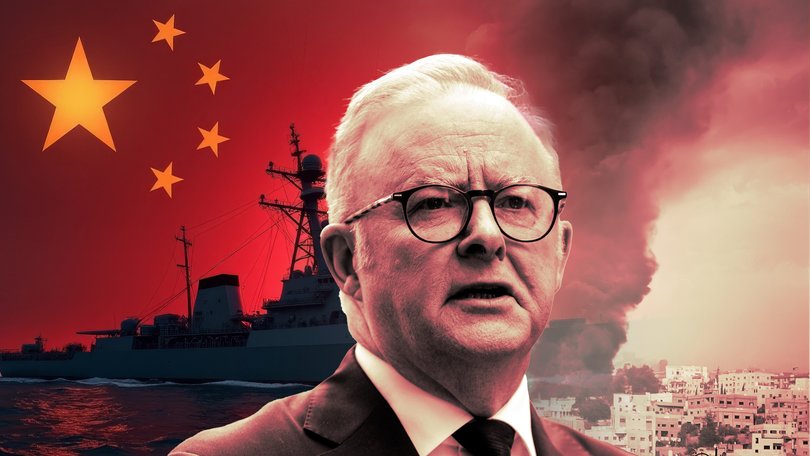AARON PATRICK: While Anthony Albanese pleased Hamas, a naval crisis was brewing with China
AARON PATRICK: By recognising a nation that does not exist, the government damaged Australia’s relationship with the only country capable of preventing China’s dominance of the region.

On Monday morning, as Anthony Albanese’s cabinet debated recognising a state of Palestine, tensions were mounting near a speck of earth in the South China Sea known as Scarborough Shoal.
A Filipino patrol boat resupplying fishing boats near the atoll came close to being run over by a large Chinese destroyer, the Guilin. Narrowly missing the Filipinos, the warship cut off a Chinese Coast Guard corvette, inflicting such damage that former Australian naval commander Jennifer Parker reckons the boat’s a write-off.
Apart from some passing interest in dramatic footage of the collision, the confrontation was mostly ignored in Australia, where political debate was consumed by the government’s intervention in one of the world’s most intractable conflicts.
Sign up to The Nightly's newsletters.
Get the first look at the digital newspaper, curated daily stories and breaking headlines delivered to your inbox.
By continuing you agree to our Terms and Privacy Policy.That was a shame because China’s aggression in the South China Sea is a direct and persistent threat to Australia. Monday’s confrontation could have quickly escalated into a diplomatic or military crisis if a Filipino sailor had died, an event President Ferdinand Marcos Jr has said could trigger war.
Damaged relationships
Instead of admonishing China for maritime bullying, the Albanese government spent a week explaining and defending recognition of a nation that does not exist.
In the process, it damaged Australia’s relationship with the only country capable of preventing China’s dominance of the region, the US, further marginalised Australia’s small but successful Jewish community and provided succour to the Hamas terrorist group, which expressed delight at the recognition decision, much to the Prime Minister’s embarrassment.
In Washington, Australia’s anti-Israel shift was noted in the White House. “There is an enormous level of disappointment and some disgust,” American’s ambassador to Israel, Mike Huckabee, told the ABC’s 7.30 program Thursday.
Australia’s relationship with America is at a sensitive moment. A Pentagon official and noted AUKUS sceptic is reviewing the deal to sell Australia nuclear submarines, a pact considered by both sides of politics to be the foundation of Australia’s maritime defence for the foreseeable future. As a trading nation, Australia also depends on President Donald Trump’s good favour to access the world’s biggest economy.
To be fair on Mr Albanese, the Palestinian tilt is consistent with his three years and three months in power. In addition to foreign affairs, the government has shifted left on taxation, welfare, education, industrial relations, health and industry policy. Mr Albanese leads what looks like the most left-wing government since Gough Whitlam’s from 1972 to 1975.
Talkfest
Next week will come another key moment for the government. Lobbyists, unionists, politicians and policy experts will gather over three days in the cabinet room to listen to each other propose ideas to help the economy.
Mr Albanese, who came up with the idea, has tried to lower expectations the meetings will change much. He seems to have succeeded. A poll to be published Saturday is likely to report only 13 per cent of Australians are aware of what has been called an “economic reform roundtable”, an official term for what many people would call a talkfest.
The problem is real. Invitee and economist Chris Richardson has pointed out a statistic so disturbing it deserves to be repeated: Australians’ living standards rose 1.5 per cent over the past decade. Across the rich world, they increased 22 per cent.
Australia is being left behind. Yet the government’s priorities are seeking Middle East peace, holding meetings to hear ideas that have been circulating for years, and relying on the Reserve Bank to dampen economic pressures.
No wonder so few Australians are paying attention.

